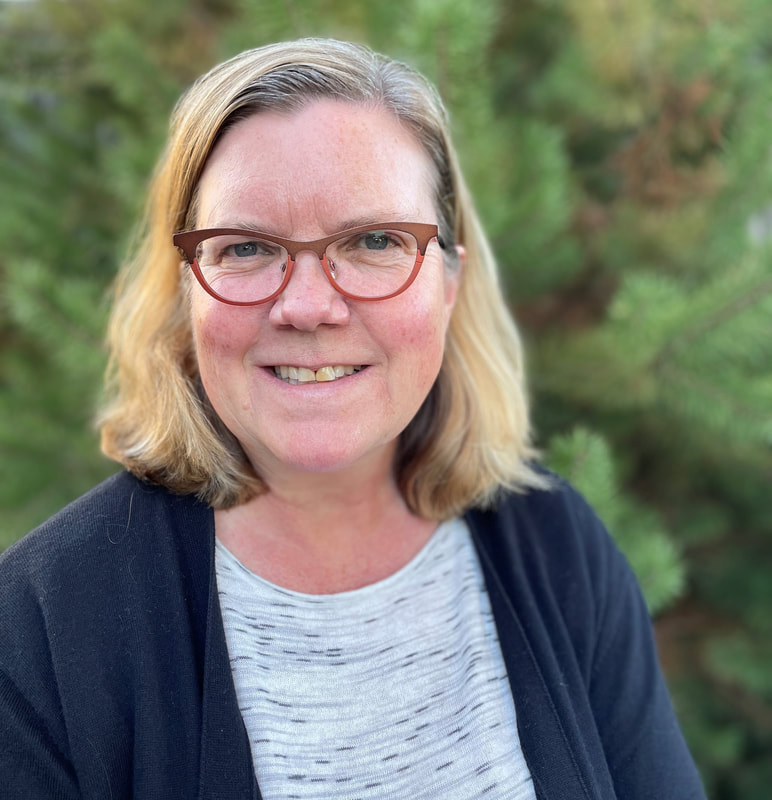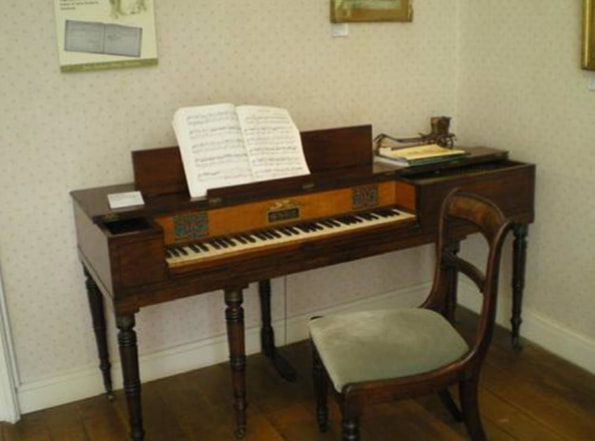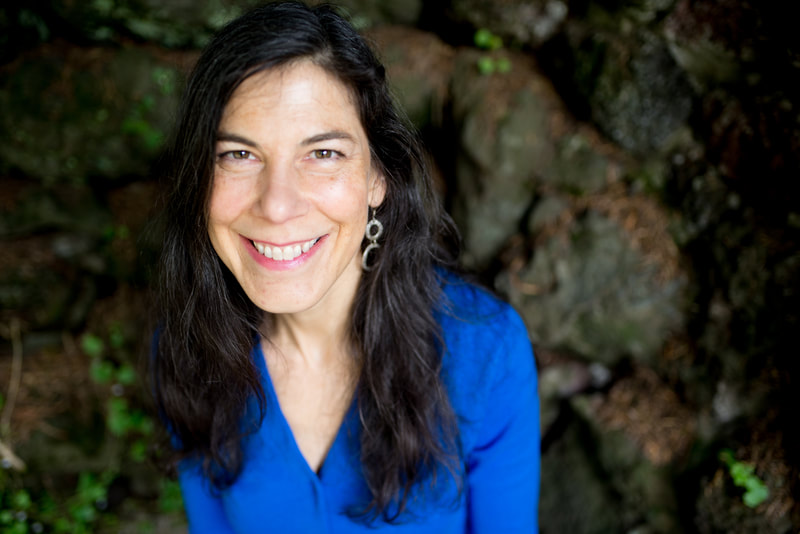Discussion Leader: Elaine Blatt
Moderator: Stephanie Fleming
By Vonnie Alto, Secretary
| ja_music_slides.pdf |
| music_links.jpg |
Our Maestro for the afternoon was Elaine Blatt who led our meeting. Elaine is a longtime member of our region, and of JASNA, and a lifelong Jane Austen fan and enthusiast since the age of 12. Elaine studied violin since age 8 and currently plays in two community orchestras in the Portland area. She also studied piano as a child.
Elaine discoursed on the context of music created in Jane Austen’s time accompanied by informative and sumptuous slides of the period.
Co-presenter, Stephanie Fleming moderated the event as the Master of Ceremonies. She provided the accompanying music with links to ten music samples that illustrate the music that Jane Austen would have played and heard during her life—with a focus on the piano as that was Jane’s instrument plus a history of Jane as a concert goer and her family’s involvement in music.
Below are the musical links to follow along with the presentation.
Introduction:
- Music Sample #1: ♪ Mozart Piano Sonata No: 11 A Major, K 331 https://bit.ly/3eRfxzB
Music in Jane Austen’s Books/Movie Adaptations.
- Elaine asked us the following introductory questions:
- Who are the best musicians in JA’s books?
- Jane Fairfax and Mary Crawford.
- Who was the worst musicians?
- Mr. Collins.
- What are your favorite musical moments in Jane Austen’s books?
- What are your opinions of how music is portrayed in the movie adaptations of Jane Austen’s books?
- We had a fun discussion comparing musical characters in Jane Austen’s books and favorite musical moments in Jane Austen’s writings.
- Who are the best musicians in JA’s books?
Musical Overview:
- Elaine then provided an overview of the musical periods: Late Baroque, Classical, and Romantic.
- Late Baroque Period.
- The period that preceded the Classical period (Jane Austen lived pretty squarely in the classical period). Baroque music is characterized by complexity and polyphony (two or more simultaneous lines of melody -- most easily seen in the fugue).
- Bach (1685-1750)
- A giant of the late Baroque Period and a central figure. Bach is the definitive Baroque composer -- incredibly prolific, and the first name that comes into most people’s mind for the period.
- Handel (1685-1759)
- A German composer of the late Baroque period, who ended up in London when his patron, Prince George of Hanover, became King George I of England. His music would have been very familiar and very popular among people in Jane Austen’s time, as he was a towering musical figure in England.
- The Classical Period.
- Characterized by simplicity rather than complexity.
- Use of formality to achieve a "clearer," "cleaner" style that used clear divisions between parts (notably a clear, single melody accompanied by chords), brighter contrasts and "tone colors" (achieved by the use of dynamic changes and modulations to more keys).
- Characterized by homophony, a birth of contrasts and colors with a move towards simplicity and more formality to achieve a cleaner style.
- Brighter contrasts and tone colors achieved by dynamic and key changes with greater emphasis on instrumental music.
- In the classical period, music was played by small orchestras for the upper class and wealthy.
- By the time that Beethoven entered the music scene, the world was marked by the rise of gigantic music played in a gigantic concert hall. This led to listening to symphonic music as a public entertainment not just an opera.
- Beethoven (1770-1827)
- Beethoven is also a giant -- his early compositions get classified in the Classical period, but he progresses into the Romantic period – with the transition beginning in the very early 1800s and continuing to Beethoven's death in 1827. As a musician, he is one of the great composers of all time.
- Straddled both the classical and romantic periods, especially in Jane Austen’s later works.
- Beethoven’s genius has immense complexity. He maximized the orchestra with variances from very soft to very loud dynamics of music with big dynamic swings.
- Member Arnie Perlstein noted that Beethoven expanded the form from Mozart by 30 minutes.
- Mozart (27 January 1756 – 5 December 1791)
- A giant of the classical period, which followed the Baroque. He would have been well known to people in Jane Austen’s time.
- Haydn (31 March 1732 – 31 May 1809):
- Also a major figure in the classical period, friend and mentor to Mozart.
- Haydn spent time in London, so was particularly familiar to people in Jane Austen’s time.
- Pleyel (1757-1831):
- Ignaz Pleyel was a French composer and piano builder.
- He was a favorite student of Haydn.
- Like Haydn, he lived in London for a time after he escaped from the French Revolution in 1791.
- Pleyel and Haydn each had competing concert series in London. Pleyel was a particular favorite of Jane Austen. He wrote a lot of piano music that was often given to purchasers of pianos during the time of Jane Austen.
- He focused on piano making and publishing sheet music.
- Yet he composed 42 symphonies, 70 string quartets, and several operas.
- The Romantic Period.
- Followed the Classical Period and rejected restraint and formality of the classical period with such composers as Mozart, Hayden, Pleyel, and Beethoven (although later, Beethoven is definitely in the Romantic period).
Music in Jane Austen’s Books.
- The overriding question: How is music played in Jane Austen’s books?
- A favorite sound track of the BBC Chopin music illustrates the story well.
- A visiting guest said that the composer of the soundtrack for the Emma Thompson version of Sense and Sensibility is cited online as having referenced a Chopin sonata in his soundtrack, but the website didn’t specify which one.
- Members noted that music in the current Emma film (2020) is funny and illustrates the comic scenes.
The Rise of the Piano.
- The harpsichord in the 1600s was the forerunner of the piano.
- Music Sample #2: ♪Handel Air and Variations: https://binged.it/3y5627t
- However, the rise of the piano killed off the harpsichord which disappeared in the 1800s and didn’t re-appear until the 20th century with a revival in interest in performing Baroque music on appropriate instruments.
- The piano was a big development in Jane Austen’s time.
- The piano allowed for dynamic changes that Classical composers favored.
- The making and selling of pianos was a big business. Often music was given away with a piano purchase.
- In the late 1700s, the Broadwood piano entered the music scene.
- The Broadwood piano expanded the number of keys from 55 to 88 piano keys and added pedals
- Favored by both Beethoven and Haydn.
- A technical innovation that allowed Beethoven to achieve dynamic innovations in his symphonies.
- Pleyel’s sheet music was given away with the purchase of a Broadwood.
- Also late in the 1700s, the Square pianos emerged for the less wealthy or rising middle class.
- Georgiana Darcy in Pride and Prejudice would have had a beautiful Broadwood Grand piano; less affluent families could still enjoy the music of the smaller piano pieces.
- Jane Austen discussed purchasing a box type square piano, which was less expensive and more suitable for smaller homes. She budgeted about 30 pounds for the purchase, equal to about $2,750 in current currency. Unfortunately, the original square piano from her home no longer exists.
- The Broadwood piano expanded the number of keys from 55 to 88 piano keys and added pedals
Jane Austen’s Musical Background.
- Jane Austen’s music collection and the music she would have played and enjoyed at home was discussed.
- Jane loved music and played the piano daily.
- Jane kept an extensive collection of sheet music.
- Jane played and sang for her family and attended concerts.
- However, it’s unknown which pianos Jane played.
- It was common to borrow music at the time then hand copy the music. This helped people to learn the music. This is what Jane did.
The Austen Family Music Collection.
- 18 volumes of Jane Austen’s family music collection survive to this day, preserved by the Knight family and given to the Jane Austen Society in Britain.
- All 18 volumes have been painstakingly cataloged and digitized by the University of Southampton and are available online so you can see every page. Gillian Dooley recently completed the task of cataloging each playable piece in the collection.
- The total collection includes nearly 600 pieces of sheet music.
- Two volumes are personal albums containing music hand copied by Jane.
- Many are piano reductions.
- Mostly songs for the keyboard and harp containing works by both well-known and lesser known composers.
- Many works are by the famous composers: Mozart, Haydn, Handel, Clementi, Pleyel.
- Keyboard Volume.
- First Volume: Juvenile Songs and Lessons for Young Beginners. Jane added the descriptive phrase, “Who Don’t Know Enough to Practice.”
- Features music from 1790-1810.
- Many are piano reductions meaning orchestral works arranged for piano playing.
- Music Sample #3: ♪ Duke of York’s New March from The Marriage of Figaro https://bit.ly/3rvjnU6
- Music Sample #4 by an anonymous composer: ♪ Scotch Air https://bit.ly/3rvOPBF
- Illustrates the less highbrow aspects of the music Jane Austen copied, many of which were Scotch folk tunes.
- Second Volume: “Songs and Duets.”
- Features music from 1790-1805.
- Vocal music (solo and ensemble) mainly with keyboard accompaniment.”
- Many hand copied by Jane.
- Music Sample #5: ♪ My Phillida – A Favorite Arietta: https://bit.ly/3i4cuGi
- Printed editions of solo keyboard music published between 1785-1795.
- Music Sample #6: ♪ Pleyel Sonatina III, in F major: https://bit.ly/3kOpKk1
- First Volume: Juvenile Songs and Lessons for Young Beginners. Jane added the descriptive phrase, “Who Don’t Know Enough to Practice.”
- Jane’s music collection included The Battle of Prague.
- A theatrical participatory music re-enacting the engagement between the Prussians and Austrians before the battle in 1757.
- Popular during the 18th and 19th century.
- Of course, we were all interested because The Battle of Prague musical reenactment has been rescheduled for our region to perform in December 2022.
- Memorable from the 2017 Huntington Beach AGM where it was performed.
- A visual clip showed the relevancy of The Battle of Prague today with an example from the 2017 AGM with members Stephanie Fleming, Elaine Blatt, and Dula Baker enjoying the music that Jane Austen enjoyed. They participated in the re-enactment with swords.
- They all agreed that it was hysterical to re-enact it.
- Stephanie noted that she highly recommends this activity for JASNA regions.
- It gave them a deeper understanding of the importance of music in Jane Austen’s life as Jane Austen’s family loved theater and performed The Battle of Prague for entertainment.
- A visual clip showed the relevancy of The Battle of Prague today with an example from the 2017 AGM with members Stephanie Fleming, Elaine Blatt, and Dula Baker enjoying the music that Jane Austen enjoyed. They participated in the re-enactment with swords.
- A clip played from the Battle of Prague where the music sounds like flashing armies.
- Music Sample #7: ♪ Battle of Prague: https://bit.ly/3eUaUod
- Member Karen Kinzey noted that the piece could be right out of a Buster Keaton or Charlie Chaplin movie.
Performance in Regency England.
- The Upper Assembly Rooms building in Bath hosted dances and organized card playing, but also were the site of some concerts. Concerts were commonly held in the Tea Room. See slide.
- Jane Austen attended public performances and concerts in the tearoom at Bath (see slide).
- See Slide 14 for a visual of the Upper Assembly Rooms in Bath where Jane Austen would have heard musical performances.
- Music Sample #8: ♪ Mozart aria, Ruhe Sanft, from opera Zaide: https://binged.it/3zzWfGy
- Member Kim Higgins said that her favorite scene in Persuasion is where Captain Wentworth and Ann exchange comments about music.
- Jane Austen also attended performances of the Royal Opera at Covent Garden in London when visiting her brother.
- The biggest venue was The Theatre Royal where there were lots of comical and serious opera performances.
- Music Sample #9: ♪ Arne Overture to Artaxerxes https://binged.it/2VaeSC4
- Jane Austen noted in her letters that although she found it tiresome to do, she copied an overture of it for her music collection.
- After the presentation concluded, Stephanie Fleming invited us to ask questions and share comments.
- Everybody in attendance loved the presentation!
- It was a most charming, knowledgeable, insightful and innovative presentation!
- Seemingly a first for our region as nothing like this had been done before in a reading group for our region.
- One of our members noted that Jane Austen enjoyed music that she played for fun, entertaining family and friends.
- Arnie Perlstein asked if Elaine mentioned that the piano given to Jane Fairfax was a Broadwood?
- Elaine said that it’s uncertain which type of piano was given to Jane Fairfax, but that it’s probably a Broadwood piano. She said that Broadwood pianos were known to be the best pianos made in England so Jane Austen readers would have known that the gift Jane Fairfax received was very valuable.
- Who taught Jane Austen piano?
- Not known. Elaine said that Jane and Cassandra both studied piano at home.
- Did Jane play harp at all?
- There’s no evidence that Jane Austen played the harp.
- Did Jane’s sister, Cassandra play the piano/harp?
- Definitely, Cassandra studied piano as a girl.
- Elaine thinks that she heard that Cassandra also played the harp.
- However, Cassandra wasn’t particularly musically inclined.
- Arnie Perlstein said that Jane’s writing is influenced by the fact that she was a musician.
- Jane’s writing has rhythm. Her novels are like a big piece of music.
- There’s themes and variations observed Arnie. Elaine agreed.
- Our musical event ended with a closing song from Beethoven.
- Music Sample #10: ♪ Beethoven Sonata #29 Op.106 https://binged.it/3iHspJv
- A discussion continued about Jane Austen’s music.
- A visiting member from Sydney Australia noted that Jane Austen was “obviously very advanced musically, technically, and otherwise, but none of her heroines were accomplished in the arts, at least not to a professional level.”
- For example, Marianne Dashwood.
- Jane Fairfax, while not a heroine, was also portrayed as highly accomplished.
- A visiting member from Sydney Australia noted that Jane Austen was “obviously very advanced musically, technically, and otherwise, but none of her heroines were accomplished in the arts, at least not to a professional level.”
- Elaine noted that music was considered a leisure activity.
- However, Elaine noted that women in the social class portrayed in Jane Austen’s novels (at least the heroines) largely studied music as part of their education and to become more attractive marriage prospects.
- Becoming a professional musician would generally not have been something young women in Jane Austen’s world would have thought of doing. There were female performers, but they were not common. In England at this time, it was considered proper for ladies to study only piano, harp, or voice.
- A discussion continued about Jane Austen’s music.
Thank you, Elaine Blatt for volunteering your musical expertise to give us a thorough and captivating look at music during Jane Austen’s time and in her writings!
And thank you, Stephanie Fleming for serving as Master of Ceremonies and moderating and playing the music for us!
Your collaboration is most appreciated! Seemingly, this was one of the most unique and technologically innovative reading group discussions we’ve had in the history of our region!


